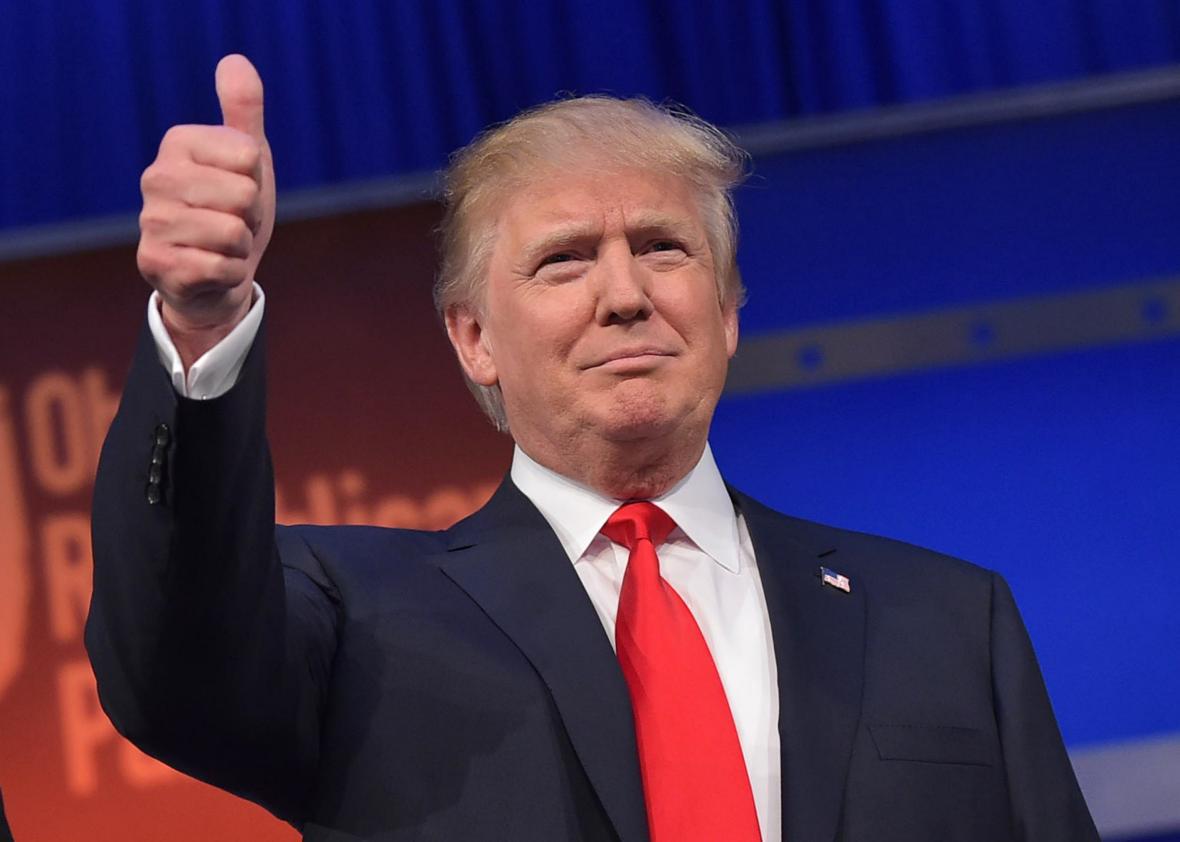Another poll, another good day for Donald Trump. The latest Des Moines Register-Bloomberg survey has the brassy billionaire leading the GOP field in Iowa by 5 points over Ben Carson and another 10 points over everyone else. That, though, isn’t why the survey should be giving the Republican establishment heartburn.
The more worrisome news for GOP powerbrokers is not that Trump is leading in the Hawkeye State—that’s been the case for more than a month now—but why and how he is leading. Dig down into the survey’s crosstabs and there’s evidence that runs counter to two of the chief things that Republicans have been consoling themselves with during the Summer of Trump: The first is that despite the billionaire’s unexpected rise to the top of the polls, his appeal is too limited to attract the kind of support he’ll need to stay there once the field narrows. The second is that the Donald’s allure is all about his personality and not about his actual policies.
Both of those fundamentals are likely still generally valid—but the new numbers out of Iowa suggest they might not be as rock solid as Republican powerbrokers would like to believe. Let’s take them in order:
Trump’s ceiling
The Donald has so far displayed an uncanny ability to ignore the laws of political gravity. He’s dabbled in racism, misogyny, and conservative apostasy this summer, and yet—despite repeated predictions to the contrary—he remains the Republican leader both nationally and in the early-nominating states. Still, the thinking goes, his abysmal favorability numbers and narrow appeal mean that he has a ceiling that will prevent him from ever garnering the type of support he’d need to be competitive in 2016.
That may still prove true in time but right now Trump’s Iowa ceiling looks a whole lot higher than it once was. In the three months since the last time the Register’s pollsters asked the question, the percentage of likely GOP caucus-goers who said they could “never” vote for Trump dropped in half from 58 percent—the highest in the field at the time—to 29 percent, a number roughly in the middle of the Republican pack. Likewise, those who said they could see themselves voting for Trump doubled from 34 to 68 percent over that same period. His favorability splits tell a similar story: 61 percent of likely GOP caucus-goers said they had a favorable opinion of him, compared to 35 percent who had an unfavorable one. That’s a near complete reversal from where those numbers stood in May, back when no one thought he’d actually get in the race.
In short, Trump might not need to increase his slice of the GOP pie to win in Iowa. Mike Huckabee took the 2008 caucus with about a third of the vote, while Rick Santorum needed only a quarter of it to eke out his victory four years later.
Personality vs. policies
It’s going on three months since Trump called everyone’s bluff and jumped into the race, but political observers—myself very much included—are still trying to figure out exactly what it is about Trump that is so appealing to his supporters. The working theory is that it’s much more about his personality—the combination of his anti-establishment anger and brash bluster— than about his specific policy views. That still seems like a safe bet. In the Iowa poll, for example, 57 percent of Republican respondents said that when it comes to policy specifics, they trust their first choice candidate “to figure it out” once he’s in office, compared to only 41 percent who wanted to be clear up front where that candidate stood. That’s a good sign for Trump: I’ll figure it out is his unofficial campaign slogan when it comes to policy. (Though the rest of the GOP field could make a similar claim.)
Still, Trump has gotten specific on immigration. And on that topic at least, Iowa Republicans like what they’ve heard. When pollsters asked about Trump’s deport-them-all immigration strategy without mentioning his name, it was remarkably well received. Nearly half of the Republicans polled—47 percent—said that “rounding up 11 million immigrants in the U.S. illegally and sending them to their home country” would be a “good way” to address the nation’s immigration problems, compared to 37 percent who said the opposite. Meanwhile, two-thirds of the GOP respondents said that generally speaking, the issue of illegal immigration was a strength for Trump.
I’m still confident that Trump’s GOP campaign will end well before the Republican Party selects its nominee in the summer of 2016, and 2015 polling won’t change that. But if I were part of the GOP establishment that can’t wait to put the Donald in its rearview mirror, I’d start preparing myself for the reality that the Summer of Trump is unlikely to be the fall of him.
